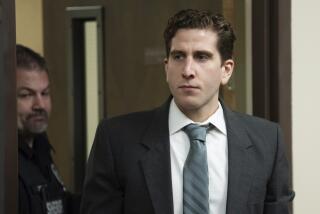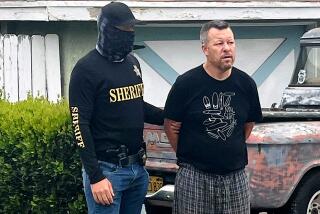Prosecutors Fight Moving Famalaro Trial
- Share via
SANTA ANA — Drawing on the Rodney King beating and the notorious “Freeway Killer” case, prosecutors insist that an impartial jury can be found among Orange County’s more than 2.5 million residents for the trial of a handyman accused of killing a woman and keeping her nude body in a freezer.
Defense attorneys for former Lake Forest resident John J. Famalaro want his murder trial on charges of killing 23-year-old Denise Huber moved to another county. They say knowledge about the case among local residents is “unprecedented” and would prevent their client from getting a fair trial.
In court papers filed for a Feb. 14 hearing on the issue, Senior Deputy Dist. Atty. James Mulgrew argued to keep the case here. He pointed to the notorious 1991 trial of four Los Angeles police officers caught on videotape beating King after a traffic stop as the only instance where a change of venue was required in a place as populous as Orange County.
The publicity surrounding the Famalaro case pales in comparison to the King case, said Mulgrew, who acknowledged that while media coverage of the Huber murder has been “extensive,” most of the news coverage occurred more than two years ago, after Huber’s body was discovered and Famalaro was arrested.
The Huber case “has not come close to matching the massive attention received by the Rodney King case,” Mulgrew wrote. “Moreover, it has not had any of the extensive political or social implications found in the Los Angeles case, nor the potential impact on the lives of jurors.”
The prosecutor, responding to a change of venue motion filed by Famalaro’s defense team, also repeatedly cited the high-profile case of William Bonin, a serial killer known as the “Freeway Killer,” as an example of a trial that received immense publicity but was held locally after a request for a change of venue was denied.
Mulgrew also challenged a defense survey submitted to the court which showed that 83% of the prospective jurors they polled last fall were aware of the Famalaro case and that 58% believe he is guilty and should be sentenced to death.
The prosecutor wrote that even if the survey were accurate, “that still leaves a very large number of residents in Orange County who would be qualified to sit as jurors in this case.”
The defense contends that the disappearance of Huber and news of her death three years later brought about profound public sympathy for her family and severe loathing toward Famalaro. They note Huber’s “posthumous celebrity” as one of the key factors in the request to move the trial.
But the prosecution responded that the Orange County population is larger than that of 17 states and is the fifth-largest county in the nation, easily offering enough people from which to pick an impartial jury.
Famalaro, 39, is accused of kidnapping, sexually assaulting and bludgeoning Huber after her car broke down on the Corona del Mar Freeway in June 1991. Famalaro was arrested in July 1994 after authorities discovered Huber’s body in a freezer in a stolen rental truck parked in the driveway of Famalaro’s home in Dewey, Ariz.
Famalaro has pleaded not guilty to the crimes. He faces the death penalty if convicted.
Superior Court Judge John J. Ryan will decide the defense request for a change of venue. Jury selection begins Feb. 24 and Ryan is prepared to question as many as 1,000 potential jurors.
Famalaro was back in court Wednesday as attorneys for both sides continued their battle over what evidence should be allowed in the case.
Famalaro’s attorneys maintain that warrants obtained by police to search their client’s home were either too broad in scope or that law enforcement officials conducting the searches interpreted clauses in the warrants too broadly.
“The police believed that they could seize anything that could help them with this case,” Deputy Public Defender Denise Gragg said.
The defense wants to have all of the evidence seized under three separate search warrants thrown out. But Mulgrew said for that to happen, the conduct of officers would have had to have been “egregious.”
“I think an argument can be made that some items were seized upon misreading of the search warrant,” Mulgrew said. “However, the remedy is not throwing everything out. The remedy is simply that those items get excluded.”
Orange County Superior Court Judge Kathleen E. O’Leary continued the evidence hearing to Feb. 21. O’Leary was to have presided over the actual trial before a conflict in the court calendar forced her to give it to Ryan.
The unresolved evidence issues have pushed back the scheduled start of the trial by several weeks.
More to Read
Sign up for Essential California
The most important California stories and recommendations in your inbox every morning.
You may occasionally receive promotional content from the Los Angeles Times.










